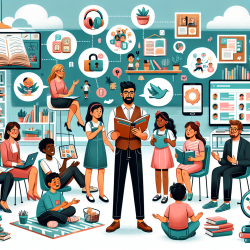In today's digital age, the art of sharing books and stories with children is more crucial than ever. The research article "Sharing Books and Stories to Promote Language and Literacy" provides insightful strategies that practitioners can implement to enhance language and literacy skills in young learners. This blog post distills key takeaways from the research, offering practical tips for integrating these findings into your classroom or therapy sessions.
1. Phonological Awareness
Phonological awareness is the ability to recognize and manipulate the sounds of spoken language. The research emphasizes the importance of incorporating phonological awareness activities into book-sharing sessions. Here's how you can do it:
- Choose storybooks that naturally highlight phonological elements.
- Engage children in rhyming games and alliteration activities based on the book's content.
- Use repetition and sound segmentation exercises to make phonological concepts more accessible.
2. Print Awareness
Print awareness involves understanding the forms and functions of written language. To foster this skill, use the "print referencing" technique during shared book reading:
- Point out words and letters as you read.
- Discuss the different parts of a book, such as the cover, title, and author.
- Highlight print concepts like punctuation and capitalization.
A structured program, such as a 30-week print awareness curriculum, can be particularly effective in a classroom setting.
3. Letter Naming Knowledge
Letter naming knowledge (LNK) is a critical predictor of early reading success. To teach LNK during book sharing:
- Focus on books that prominently feature letters and words.
- Encourage children to identify and name letters as you read.
- Incorporate activities that emphasize letter recognition and sounds.
Consider cultural differences in how families approach letter learning to make your teaching more inclusive.
4. Dialogic Reading
Dialogic reading transforms book sharing into an interactive dialogue between the adult and the child. This method is particularly effective for toddlers:
- Ask open-ended questions about the story to encourage verbal responses.
- Expand on the child's answers to introduce new vocabulary and concepts.
- Use prompts to guide the child in telling parts of the story.
While this technique is powerful, be mindful of cultural differences that may affect its implementation.
5. Vocabulary and Inferential Language
Building a robust vocabulary and developing inferential language skills are essential for later reading comprehension:
- Select books with rich, varied vocabulary.
- Pause during reading to explain new words and concepts.
- Encourage children to make predictions and inferences about the story.
Structured activities and group discussions can further enhance these skills.
By incorporating these evidence-based strategies into your book-sharing sessions, you can significantly boost the language and literacy development of the children you work with. For more detailed information and additional strategies, consider reading the original research paper, "Sharing Books and Stories to Promote Language and Literacy," available here.










